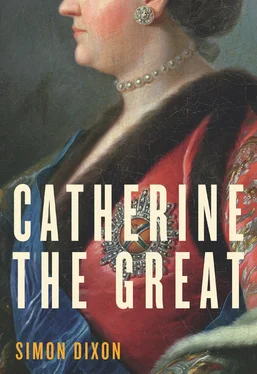When she had recovered, she composed an ironic letter to Voltaire, reassuring him that there was as yet no prospect of a truce:
I agree with you that peace is a fine thing: so long as it existed, I thought it the nec plus ultra of happiness. Now that I have been at war for almost two years, I see that one can get used to anything. War, it is true, does have some fine moments. The one great fault I find with it is that [in war] one does not love one’s neighbour as oneself. I used to think it dishonourable to do people harm; however I console myself somewhat today by saying to Mustapha [like Molière]: ‘Georges [Dandin], you wished it on yourself!’ And after that reflection, I am at ease, almost as before. 90
In fact, that same month, Catherine, while planning for the following summer’s campaign, permitted Rumyantsev to enter into peace negotiations with the Turks provided that they released her imprisoned ambassador at Constantinople (a condition they refused). What she was not prepared to accept was the repeated offers of mediation made by Austria and Prussia at the instigation of Frederick the Great, who was desperate to prevent Russia from making further unilateral conquests. 91
Catherine’s determination to hold out for maximal gain made it impossible for Prince Henry of Prussia, sent to St Petersburg by Frederick in October 1770, to persuade Russia to settle for peace. 92It was the first time Catherine had seen him since their youthful dalliance at the Court of Berlin. Small in stature and cold in manner, the king’s notoriously ugly younger brother made a poor impression on courtiers who mocked the toupee perched precariously above his unnaturally high forehead. The empress, by contrast, made a great show of warming to him, declaring Henry ‘cheerful, honest and humane’ and reassuring Frau Johanna Bielke, a friend of her mother’s in Hamburg, that ‘no visit from a prince could be more agreeable to me than his’. At any rate, as she observed sarcastically to Voltaire, shortly after Henry’s departure in January 1771, ‘he seemed to enjoy himself here more than the abbé Chappe, who raced along the post-road in an entirely enclosed sleigh, from which he saw everything in Russia.’ 93
Competitive to the core, Catherine had good reason to impress her Prussian rivals. ‘You know how patriotic I am,’ she reminded Field Marshal Saltykov, who had defeated Frederick at Kunersdorf: ‘I wish our nation to shine in all the military and civil virtues and that we should surpass all other nations in every genre.’ So she spared no expense to ensure that her guest returned to Potsdam convinced that the Russians were ‘sufficiently polite to know how to beat their enemies’. 94She sent three yachts to meet him at Reval, where she personally arranged for a suitable wine cellar and Court chef to be on hand at the Yekaterintal Palace. 95Soon after arriving in St Petersburg, Henry attended the thanksgiving prayers for the fall of Bender. Later he was shown captured Turkish standards at the Peter-Paul fortress, where Peter the Great’s ‘little boat’ was on display as a symbol of Russian naval power. 96Determined to demonstrate that she could outdo even such a virile predecessor, Catherine also took Henry to see the ‘thunder-rock’, a block of Karelian granite weighing some 3 million pounds on which Falconet planned to mount his statue of Tsar Peter. This massive boulder, so-called because peasants believed that the crack at one corner had been caused by a bolt of lightning, had taken far longer than Henry himself to reach the Russian capital. Selected for the purpose just before the outbreak of war, it began its overland journey from Count Bruce’s estate at Konnaya in November 1769, using machinery designed by a Greek engineer. ‘Daringly performed’ was the inscription on the medal struck to commemorate Catherine’s visit to see the rock on 20 January 1770, when it was being rolled along at the rate of approximately a mile per month. For the final part of its journey, it was floated down the Neva on a purpose-built raft, reaching St Petersburg on the eighth anniversary of Catherine’s coronation. A few days later, Prince Henry saw it manoeuvred into position at the centre of Senate Square, where it still stands today. Acknowledged across Europe as a stunning feat of engineering, this operation was duly claimed by Catherine’s panegyrists as superior to the building of the Egyptian pyramids and the creation of the Colossus of Rhodes. 97
On 28 October, Henry was driven to Tsarskoye Selo under cover of darkness in a sledge equipped with mirrors so that the snow-covered landscape would seem to stretch to infinity. After a brilliantly lit triumphal arch there followed a series of illuminated pyramids and pleasure gardens in which peasants dressed in national costume could be seen dancing behind newly married couples in an allegorical display of fertility and happiness. Outside the menagerie, Semën Naryshkin had arranged for a Temple of Diana, where his huntsmen played on their distinctive horns. 98Still more extravagant was the masquerade staged at the Winter Palace on 28 November when some twenty-one staterooms were commandeered to provide dancing and games for 3600 guests. Shortly before nine, a fanfare of trumpets announced the arrival of Apollo with the four seasons and the twelve months of the year, played by boys from the Cadet Corps and girls from the Smolny Convent school for noble girls. Twelve alcoves, each set with a table for ten, had been created in the banqueting hall. 99The stolid soldier must have needed all the tact he could muster to smile at a Frenchman in parrot costume who squawked ‘ Henri! Henri! Henri! ’ into his ear before vanishing into the crowd. Yet it was hard not to admire the pyrotechnic representation of Russia’s recent conquests. For all Catherine’s periodic attempts at self-restraint, the Court of St Petersburg had lost none of its fascination for Baroque spectacle:
The various colours, the bright green, and the snowy white, exhibited in these fireworks, were truly astonishing. For the space of twenty minutes, a tree adorned with the loveliest and most verdant foliage, seemed to be waving as with a gentle breeze. It was entirely of fire; and during the whole of this stupendous scene, an arch of fire, by the continued throwing of rockets and fireballs in one direction, formed as it were a suitable canopy. 100
Literary celebrations of the Russian victories and Catherine’s letters of this period betray the ideological foundations of the so-called Greek project which emerged between 1780 and 1782—the plan to recapture Byzantium and install a Russian ruler on its throne. 101‘Soon it will be time for me to study the Greeks at some university,’ the empress told Voltaire in October 1770, ‘until such time as I can translate Homer into Russian.’ She made a start by donning Grecian costume for the masquerade in honour of Prince Henry. 102
So determined was Catherine to advertise the magnificence of this event that she checked several times that Voltaire had received her detailed description of it. 103Indeed he had, but it was her triumphs at the expense of the Infidel that really sparked his imagination. As she regaled him with Aleksey Orlov’s lurid accounts of the waters of Chesme harbour churning with Turkish blood, he responded by picturing himself ‘transported’ from the eighteenth century ‘to the Alps at the time of the foundation of Babylon’: ‘Monsieur d’Alembert, who is here at Ferney now, is as enthusiastic as I am, and the only difference is that he expresses himself better. We both hate Mustapha just as much.’ 104
* * *
Blissfully unaware of the danger he faced, Prince Henry left Moscow only days before Saltykov, the city’s Governor General, reported an epidemic on 22 December 1770. Catherine had first referred to the disease at the end of May, when she gave her approval to counter-measures taken by Rumyantsev in the south-west. By the time Kiev succumbed in mid-September, she was already concerned about the threat to the old capital, ‘for besides sickness and fires, there is much stupidity there’. 105Since it was almost certainly Ottoman cloth that carried what she called the ‘infectious pestilential distemper’ to the heart of the Russian empire, the empress’s efforts to blame it on the enemy carried some plausibility. But while Voltaire urged her to ‘exterminate the two great scourges on earth, the plague and the Turks’, 106a cure proved elusive as doctors continued to debate the nature of the disease. Though a cold snap in the New Year brought a temporary respite, warmer weather saw a sharp increase in mortality at Moscow’s leading woollen manufactory, prompting the police to stage a secret evacuation of the 640-strong workforce on the night of 13 March 1771. Sensing trouble ahead, many nobles fled to their rural estates. Since nothing alarmed Catherine more than indecision, Saltykov was tactfully sidelined at the end of the month to allow Senator Peter Yeropkin to take charge of the anti-plague campaign. At first, his impeccably modern methods suggested little for the authorities to do. Statistics supplied by the parish clergy showed no marked increase in the death rate, and Archbishop Amvrosy sensibly warned that public prayers for deliverance were likely to result only in panic. No one anticipated the scale of the disaster to come, and only a mass evacuation of the city—scarcely a feasible option—would significantly have stemmed the losses that followed in a warm, wet summer which provided the ideal conditions for the spread of plague. 107
Читать дальше












